There are some really interesting perspectives from the participants who came from Germany, UK, Austria and Malaysia.
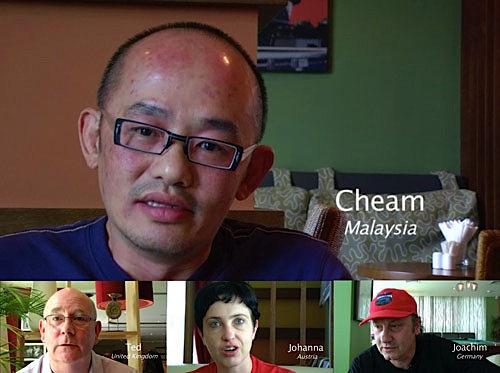
You can watch the video at http://www.thewallington.net/learning-r ... iences.mp4
I can provide a higher quality version to anyone interested as this is released under a Creative Commons licence.
[A bit of background: The participants and me were all staying at a hotel in Dubai, having been on Emirates Airlines flights that were grounded by the Iceland volcanic ash cloud. I was on one of the first flights blocked in Dubai when UK airspace was closed around April 15/16. I was also on the first Emirates flight into Heathrow from Dubai once it re-opened about a week later. To make this video I approached each of the participants and explained a bit about my trip. I also explained that I was running workshops and wanted to produce a conversation starter around people's learning experiences. They were asked to recall a positive learning experience and to talk about why they found it positive/memorable. It's turned out to be a very useful resource, not least because it let me use some of my time productively and not go stir crazy. I'm really grateful for their very willing cooperation and participation.
Technicalities: I shot this with a little JVC 3CCD HD camcorder I took with me and used a wireless mic for audio. It was hand held only because I didn't have a tripod. It was edited using Final Cut Pro on my laptop in my room. While it's not exactly Hollywood quality, the capabilities and flexibility of consumer quality gear are quite staggering compared to only a few years ago.]
[ 1 comment ] ( 8 views ) | permalink
After a really uneventful trip back (I'm well over 'eventful' travel that invokes the word 'volcano') I'm now back in Ballarat. Got in at 5.15am on Friday morning, got through the immigration/customs procedures and onto a shuttlebus by 6.30am. Arrived in Ballarat around 8am.
It has been a really wonderful trip and learning opportunity and when the dust settles I'll be emailing all my hosts to express my appreciation for their time and the generous sharing of their knowledge and experiences.
On my last morning I managed to film a LEWS News item in Kensington Gardens which is a bit of a summary of the trip. It's at:
http://thewallington.net/learning-resou ... LONDON.mp4
Be warned it's a bit rambly and a large file so won't be great to watch if you don't have a good Internet connection.
My report will be made generally available once completed. I'll be doing the inevitable paper-based version and am also keen to come up with something more engaging that includes some audio, photographs and a different style in reporting. Still knocking ideas around on that but was inspired by some really creative student submissions in the MSc in E-learning at Edinburgh. (Thanks Sian and colleagues.)
Finally, thanks first to all the generous and lovely people who made my trip so rewarding by setting up my visits, engaging so readily and generously sharing their knowledge and experience with me. And thanks to those who've followed the trip, made their comments and helped me feel that I wasn't travelling alone.
[ 2 comments ] ( 67 views ) | permalink
In my final visit during this trip, today I visited University College London and spent the day with the Learning Technology Support Service.
Website at http://www.ucl.ac.uk/isd/staff/e-learning/ltss
This team, located within the Information Services Division provides support, training and advice for staff wanting to use Learning Technology within their teaching.
Their activities are quite similar to LEWS (with the exception of the Web, resource development and video production components) and their team is a similar size. They do provide pretty much all Helpdesk services for Moodle and roster staff for phone sessions. This will change later in the year when a broader role will be taken by the main Helpdesk to include first level Moodle support.
We had a wide ranging discussion about learning support, academic engagement, challenges and solutions. UCL have a Moodle installation, having moved from WebCT in 2007. They don't have the integration with their student systems that we have but this is slated for mid-year.
I also managed a quick trip to the Library which is a fairly traditional library. There are some open spaces for student work and collaboration but by and large it's a library of books. It was interesting that I needed to provide some ID to get in as a visitor, even though accompanied by an LTSS staff member. Of course I didn't have my UB staff card but my purchasing card seemed to do the trick. A few UK uni libraries require a student or staff card to even enter, which is not something I'm used to at UB.
UCL are rolling out Echo360 (lecture capture systems in teaching spaces) and are having very interesting and positive results following a trial of six installations. A total of twenty is planned over a two year period.
Fiona Strawbridge, the Manager of LTSS, had previously provided me with a comprehensive document in response to my survey questions and this was an excellent resource in preparing for the discussions today.
I gained a wealth of material from today's visit and hopefully left some behind me.
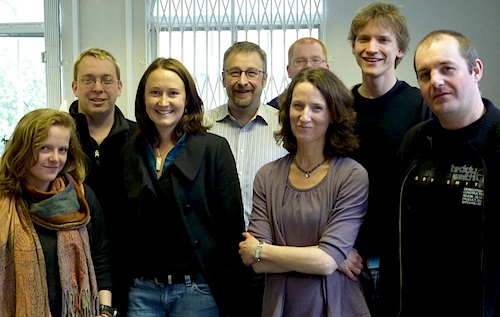
The members of the friendly Learning Technology Support Team who I met with at University College London. From left Annora, Jason, Jess, Clive, Tim (from Academic Tech Services), Fiona, Matt and Steve.
Once again, a great bunch of people doing interesting things and facing the same challenges we all seem to face. A very obvious and positive team culture. The staff, as at one or two other places, were very grateful for my visit, if for no other reason than it resulted in management providing them with a free lunch. Some things are truly universal! (And incidentally, I met my first embedded Aussie here during my UK trip.)
[ 3 comments ] ( 156 views ) | permalink
This has been another highly worthwhile visit. There are a number of striking parallels between Glasgow Caledonian and UB. On of these is that we both became universities at roughly the same time and from Polytechnic/CAE origins.
The unit within GC that I primarily visited was the Caledonian Academy. In one sense it's a little like IPOL but much further down the track. It is charged with academic development and furthering the scholarship of learning and teaching.
The Caledonian Academy's website is at http://www.academy.gcal.ac.uk/index.html
My visit was coordinated by Linda Creanor, Development Director (Professional Development), who arranged a series of meetings for me.
The visit began with a discussion with Barbara Newland and Aidan Johnston. Barbara is the Co-ordinator and Aidan an Advisor with their Blended Learning Project; a project broadly charged with embedding the use of the VLE and learning technologies into the base curriculum. Many of the areas they are tackling and issues they are dealing with are very similar to our experiences.
Following this discussion, we went on a tour of the famous Saltire Library. This was the first really different approach to university library redesign in the UK and has been often used as an example. The paradigm change, that is now demonstrated really nicely in our very recent library refurbishment, was to make student collaborative activity a high priority for library space utilisation. The endpoint is that we have libraries becoming dynamic social centres in which contemporary group and collaborative learning thrives.
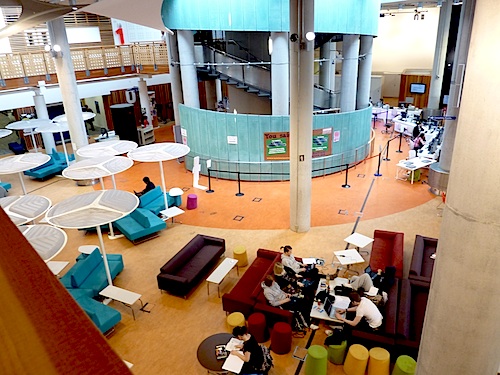
A view onto the entry level of the Saltire.
My last formal activity for the day was a really fascinating session with Ferdinand Francino and Kathryn Trinder to look at some stunning Second Life examples and to hear about Open Simulator, an open-source alternative that enables the creation of virtual, immersive communities.
Two of the examples that really stick in my mind are the nursing ward that had a remarkable degree of authenticity and the models of eyes, demonstrating various eye conditions. Initially designed to be 'walk around' models of eyes, Ferdinand had imported them into Open Simulator, scaled them up, and turned them into 'walk through models' of eyes. You could literally navigate around inside the eyes.
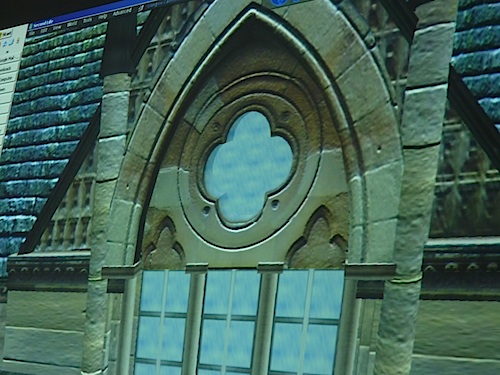
This is an example of some of the texture realised in one of the Second Life scenarios I saw
On Friday morning I met with Jim Emery, a member of the Organisational Development Team. To quote from Jim's bio "Jim supports and investigates the issues involved in the university VLE, Blackboard. He also covers desktop applications and web technologies as well as how to integrate them into Blackboard. His current interests are in the use of Web 2.0 tools such as blogs and podcasts." You could imagine we had a bit to talk about.
Later in the morning I gave an informal presentation to a small group with a bit of background on Ballarat and UB, our structure and current issues and this broadened into a stimulating discussion around many common issues. We looked at my Dubai Chronicles video and I've given them a copy for an upcoming session they have planned on internationalisation.
Finally, concluding a stimulating two days, I met with Linda and Jeff Murray (thanks Jim for the correction), CIO at the University. Jeff is an Australian and had worked under Kerry Cox at ECU for a short time before moving to Scotland. He has a strong industry background and is client focussed so has been a valuable ally for those at Glasgow Caledonian University working for better technology support. Our chat ranged far and wide and was great value.
So, that rounded out my second last visit. I liked Glasgow. While Edinburgh is stunningly beautiful I felt there was a nice edginess about Glasgow. Both great cities to visit.
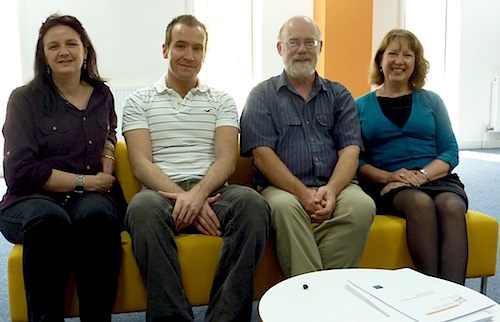
With some of my hosts, from left, Kathryn Trinder, Aidan Johnston, me and Linda Creanor.
(PS: Linda's daughter-in-law comes from Ballarat and Linda's family have visited Ballarat, including for the wedding at Tumbler's Green.)
[ 54 comments ] ( 875 views ) | permalink
I have just completed my visits to the University of Edinburgh and have arrived in Glasgow. I have two days here, returning to London by train on Saturday. There have been flight delays in Ireland and some parts of Scotland owing to a new volcanic ash cloud so hopefully Heathrow will be open next Wednesday night when I fly out.
MSc in E-learning
On Tuesday I met with some members of the Masters in Science in E-learning Team from the School of Education. These included Sian Bayne, Hamish Macleod, Fiona Littleton and Marshall Dozier. Their profiles can be found at http://www.education.ed.ac.uk/e-learning/team.htm
It was a stimulating session! They are not academic developers but essentially some of the staff teaching in this innovative and award winning program. In their own words "...depending on which programme options you choose to pursue, you will have the opportunity to learn how to build courses and learning opportunities using a virtual learning environment, how to build a web sites and construct online assessments, how to formulate an institutional strategy for e-learning, and how to nurture online study skills in your learners. You will also get the chance to investigate a range of fascinating conceptual issues, for example how the digital environment changes the way we construct knowledge, the politics of e-learning and the digital divide, and the ways in which video-gaming might affect post-school education and training."
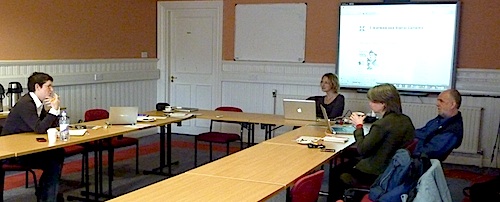
The members of the team I met with. From left Fiona, Sian, Marshall and Hamish.
We discussed a number of elements of the program and how the use of a range of technologies is underpinned, practised and extended by rigorous theoretical components of the program.
I saw examples of the embedding of contemporary technologies including very impressive Second Life activity. We wound up with a look at some remarkably creative pieces of student work that pushed the boundaries for student submissions, also raising lots of issues for academics required to assess this work.
I guess what was most interesting about this visit was that the Masters program, having been designed to develop individuals' digital/pedagogical literacy, actually walks the talk and encourages students to reciprocate with their own boundary-challenging activity.
The course information is available at http://www.education.ed.ac.uk/e-learning/
Nora Mogey, Head of Learning Services, Information Services
Nora is primarily a pedagogically oriented person who oversees two teams. One is the Technology Enhanced Learning Team and other the Skills Development Team. The Skills Development people look at IT training and information skills training while the Technology Enhanced Learning Team support a range of services. (This strikes me as a similar blend to that we have in the LEWS team.)
They have recently implemented three consultancy teams, one for each of their three Colleges made up of a blend of Library, IT and eLearning people with the intention that they will do some of the consultation, implementation and support at the School level.
In parallel with this Edinburgh has also set up an Institute for Academic Development that brings together the Centre for Teaching and Assessment, the post-graduate skills training unit, the research and development team from HR, and Nora as a voice from Information Services. Much of this restructuring is about avoiding duplication and providing better co-ordination across the University.
I was struck by the number of issues/responses at Edinburgh described by Nora that had almost direct parallels at UB. There was much more in our discussion that will have to wait for the final report.
I was also to meet with Jeff Haywood, Vice Principal Knowledge Management but unfortunately he was detained in meetings and we didn't catch up.
We concluded by having a walk around the Library to look at their redevelopments. They have an architecturally significant sixties library which has heritage protection restrictions but have nonetheless managed to implement open and collaborative student spaces. I have pictures that I'll share with our Library colleagues at UB. Something Nora pointed out was the the building appears to be made of concrete. Closer inspection shows that the elements that look like concrete are in fact limestone and they contain fossils.
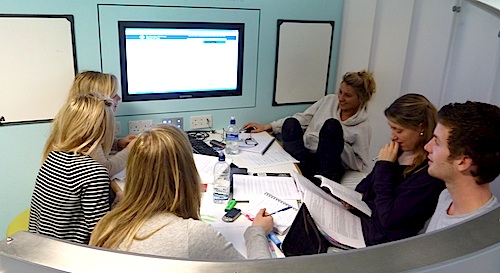
One of the collaborative spaces in the library. These were all occupied at the time of my visit which was the beginning of the exam break.
Edinburgh has about 25,000 students and a very active research profile.
All in all, another fascinating visit.
[ 1 comment ] ( 105 views ) | permalink
I'm now in Scotland and preparing for my visit tomorrow to the University of Edinburgh. Monday was a public holiday so I've caught up with some washing, sightseeing and looking over my materials.
On Tuesday I'll be meeting at Edinburgh with the team developing/delivering the the MSc in eLearning headed by Sian Bayne.
On Wednesday I'll be meeting with Nora Mogey who heads eLearning for Information Services and Jeff Haywood, Vice President Knowledge Management.
Wednesday night I'm off to Glasgow to catch up with Alison Littlejohn, Linda Creanor and Ferdinand Francino plus others over Thursday and Friday at Glasgow Caledonian.
Then back to London for a session on Monday May 10 with Jason Norton and Fiona Strawbridge, and others at University College London.
I head back to Oz on Wednesday May 12, arriving Friday at some bizarre time like 5.30am. Of course, I could end up in Dubai for a week on the way back.
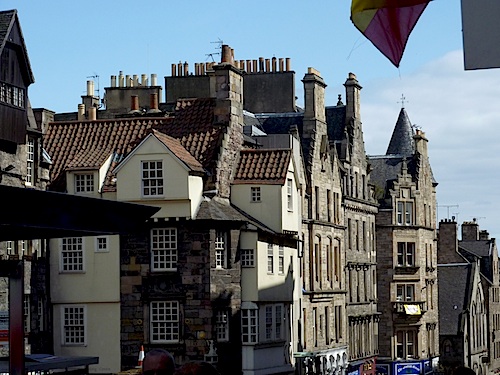
I have fallen a bit in love with Edinburgh. The architecture is stunning and the cobbled streets, walls and so on are magic. Have a look at those chimney pots. I've been walking everywhere which is both feasible because Edinburgh is pretty compact and great for seeing the sights.
[ 1 comment ] ( 93 views ) | permalink
Short visit today to the Open University.
First I met with Niall Sclater, Director of Learning Innovation and his team for an hour or so to discuss a number of issues around rolling out innovations in elearning. The scale of operation of the Open University is staggering and the campus is huge. Until a few years ago, they operated on a traditional print-based distance model so their large scale implementation of an LMS (or VLE as they are known in the UK) is fairly recent. And in a breaking edit for Adam's benefit, the VLE they use is Moodle. Almost certainly the world's biggest implementation of Moodle. Have I mentioned Moodle enough?
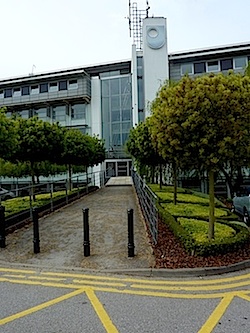
To this end they are also grappling with many issues around persuading academics to move their material into the online domain, with embedding appropriate pedagogy and trying to anticipate and plan for the numerous changes and new directions that are so much part of the learning technology landscape. I'll add more here when I'm not as tired and have a chance to review the recording.
The other person I met with was Andrew Law, Director of the Multi-Platform Broadcasting Strategy Unit. Andrew is, or soon will be, broadly responsible for three key areas of exposure of OU materials. The BBC partnership, the iTunes U presence and the OU's Youtube channel. The figures Andrew mentioned for audience reach are truly phenomenal and when I've worked over the recording I'll add them here. It's in the order of millions and billions.
TO BE CONTINUED: It was a short visit but of considerable value. When I've caught up with some sleep and work through the materials I'll add more to this entry. UPDATE: I've been listening to the audio recordings and there's so much in them I'll need quite a bit of time to review. I didn't record the first two visits but will do so for the remaining three.
Back to London tomorrow, Friday, then up Scotland on Saturday. Two visits in Scotland then back to London for a day at University College London then onto a plane for home on May 12. The time is passing quickly.
[ 5 comments ] ( 146 views ) | permalink
Hmmm, the Media Zoo that is! Well, that's the bait to catch a whole menagerie of animals that when encountered, turn out to be fascinating, challenging and inspirational projects.
About six years ago a unit called the Beyond Distance Research Alliance was established at Leicester headed by Gilly (pron. 'Jilly') Salmon, Professor of E-learning and Learning Technologies. This was set up essentially as an R & D unit by the Vice-Chancellor (Bob Burgess) who decided that Leicester needed to dramatically engage with 'online' as a strategic direction. Gilly was given a very free hand to shape the unit and it was located outside any existing organisational units at Leicester.
One of the first outputs was a Learning Innovation Strategy. This was updated (as of July 2009) and I'm bringing a copy back with me.
The key principles of the Unit revolve around research into the use of technologies in learning and teaching and, from a strong evidence base, working to see those embedded into practice.
The unit operates on the basis of a small core group of positions funded by the University and a larger group of researchers employed through projects funded by JISC and the HEA. This makes for a very dynamic and challenging environment, in which researchers are typically working against short timeframes and both competing with other institutions for funding and in other cases collaborating on joint projects. This includes some with USQ in Australia and Massey in NZ, amongst others.
The Zoo metaphor has been adopted to demystify much of the hype around technology. The projects follow that theme with animal names, indicating a remarkable capacity to generate acronyms. (I've promoted the concept of a Wombat project at some point, possibly in partnership with UB.)
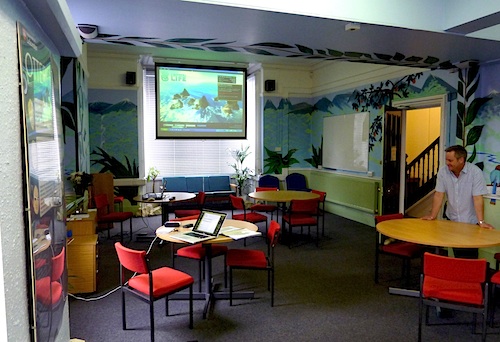
There is a physical Zoo to which academics are welcome to come to explore and play with new technologies. The idea of play is significant to remove some of the barriers and expectations that may limit people approaching technology. There is a Zookeepeer (Simon) and and Assistant Zookeper (Terese) who facilitate activity in both structured and unstructured sessions. In the Library there is a postgraduate study space and another Zookeeper, Emma, supports that space. (Emma and Simon, below.)
The Projects
Of course, the Beyond Distance Research Alliance is much more than the Media Zoo. There is an impressive array of research projects both completed and active.
You can see the list at
http://www2.le.ac.uk/departments/beyond ... e/projects
The projects cover a wide range of technologies and approaches including Second Life, (yes I'm now a convert), podcasting, exploring learning futures, Open Educational Resources, and heaps more.
Each day at 10am there's a brief Creative Meeting to which all staff come when available. It's a quick catch up. Madelaine walks the halls ringing a bell. Here's a pic of one of the meetings (with Sam in full flight) - it also proves I was actually there and not making all this up. (Thanks to Pal for taking the pic.)
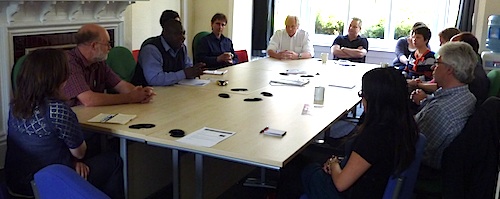
I was particularly struck by how the research has been processed into practical advice and strategies. The project outcomes typically cover both theoretical outcomes and strategies for adoption and dissemination of the research findings in ways that would enable academics to fairly readily adopt new or enhanced approaches.
I must admit I've become a reluctant convert to Second Life. Some of the work I saw at Leicester convinced me that there's a valuable role for Second Life and its equivalents. The significance of simulation has been long understood and valued in education but I think SL et al now make it feasible and relatively sustainable in general education. There are still obstacles in development and getting users up to speed but they are not necessarily show stoppers.
This has been a great experience and I've got many ideas to bring back to UB.
The main BDRA website is available at:
http://www2.le.ac.uk/departments/beyond ... h-alliance
Have a look.
[ 24 comments ] ( 1308 views ) | permalink
Flight delays behind me and not much change to my schedule
The outcome of the delays has meant I will only miss one visit of a single day. I've been able to reschedule one of my first meetings to a writing day at the end of the trip. Very good outcome under the circumstances.
Thursday 22 April
Learning Spaces Workshop
The morning was spent at a workshop being held as a University-wide event to begin a discussion toward the development of a whole-of-university approach to the planning of learning spaces. A diverse group were brought together from central units and schools to discuss their current requirements, to do some future gazing and to flag the need for a coordinated and transparent process in designing and implementing spaces and technologies.
The workshop consisted of presentations and working sessions. It moved briskly and generated a lot of good discussion. There were some striking contrasts with UB - e.g. Nursing has 3000 students, Medicine uses e-assessment but requires space for 400 students to simultaneously sit a PC based exam under exam conditions. The tensions between ideal teaching spaces and the occasional requirements for such large spaces are obvious.
Learning Sciences Research Institute
After lunch I met with Mike Sharples, Director of this centre to talk about their activity and to look at a couple of projects in detail. Mike also showed me their experimental spaces where they can configure various technologies in order to conduct research into various applications of technology in classroom/meeting spaces. They can also undertake usability testing. These are sophisticated facilities and have been designed to minimise the intrusion of the technologies into the space.
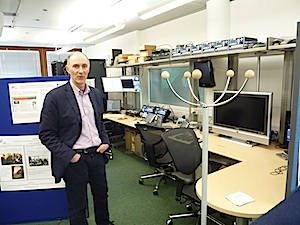
The scale and sophistication of the activity of the LSRI demonstrates why they have such a high reputation.
Their website is at http://www.lsri.nottingham.ac.uk/
Visual Learning Laboratory
Following my meeting with Mike, Brett Bligh gave me a demonstration of the Visual Learning Lab. This is a fascinating space loosely set up as a classroom but with six screens around the walls. The main PC can drive the six projectors simultaneously and the room is used to explore the pedagogy of visually enriched enriched environments.
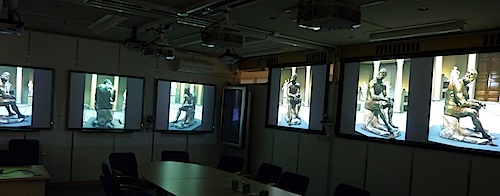
Friday 23 April
IS Learning Team
I spent a rich couple of hours with Andy Beggan of the IS Learning Team. They are located on the Kings Meadow campus in a former ITV television studio. (Eammon will be impressed when I show him the studio pic.) Interestingly, the IS Learning Team does pretty much the same range of activities as LEWS but on a much larger scale, with more organisational maturity and with some additional project development. (Xerte, Xpert etc.) This was a dynamic time with Andy and I've come away with lots of ideas and stimulation.
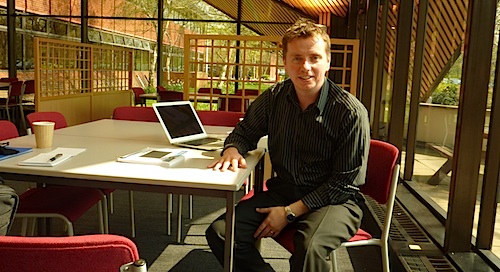
Hallward Library - Hallward Learning Hub
Finally, I met with Neil Smyth in the Hallward Library where he gave me a tour of the building. This library is an interesting blend of the old and new with very traditional collections including microfiche, combined with flexible student and workshop spaces. It houses the Centre for Integrated Learning. They don't call the facilities a Learning Commons but have open spaces, many around technology such as large screens the students can project work onto. The partitions are also whiteboard marker friendly and students do collaborative work in these spaces.

Inevitably, I've skimmed over much of what I've seen and experienced in this update. The University of Nottingham has a very strong research focus and hosts four of the Centres for Excellence in Teaching and Learning (CETLs) which I understand is more than any other uni.
The University of Nottingham main campus, on University Park, is quite spacious and very pretty. Built on land donated by Boots they have the benefit of room to grow and lovely natural spaces. The other two campuses I visited were at Kings Meadow (the former TV studio) and Jubilee Park where the LSRI is based.
Great visit, lovely people. Oh yes, lunch at the workshop included mini pork pies, scotch eggs and other English delicacies. As my colleagues would no doubt observe, I'd go to the opening of an envelope if food was on offer so I was impressed.
[ 41 comments ] ( 255 views ) | permalink
After a 22 hour day yesterday, I'm in Nottingham. About to head off to University of Nottingham for my first commitment - a planning workshop on a big development they're doing here involving learning spaces. Bit like our SciEng project but quite a bit bigger. Then a visit to the Learning Sciences Research Institute. Tomorrow meetings with a couple of practitioners.
Was on the first Emirates flight into Heathrow after volcanic shutdown - Airbus A380-800 - big mother! Great cheering and clapping when it landed. Record passage through passport, customs and my bag on carousel within minutes. Off plane and out of Heathrow in about 20 minutes and into taxi. Then bus (3hrs) to Nottingham. I think I deserved a drink in England's oldest pub after that.
OK, this will be the end of the travelogue - after this my entries will focus on why I'm here.
Great to be back on track.
[ 3 comments ] ( 135 views ) | permalink
Next

 Calendar
Calendar




